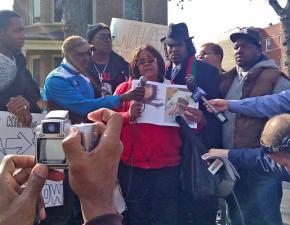Chicago cops’ latest victim
reports on another victim of a shooting spree by Chicago police.
SOME 200 people marched and rallied on March 27 at Douglas Park in Chicago, where one week before 22-year-old Rekia Boyd was shot in the head by an off-duty Chicago police officer. Rekia died 36 hours later without having regained consciousness.
The demonstration brought together relatives of the victims, community members and activists from across the city who are angry at the racism and police violence that occurs every day in this city and others across the country.
"My sister was a young, Black, innocent woman," Martinez Sutton, Rekia's brother, told the crowd. "I want people to know we did not get an apology from the Chicago Police Department. No one sent us anything--not even a Hallmark card, greeting, e-mail, or anything. Nobody followed up with us."
On the night of the shooting, Rekia was on the edge of Douglas Park when an off-duty officer pulled up near a group of people. According to the police version, the detective was investigating a noise complaint. He claims that a man carrying a gun advanced on his car, and that's when he opened fire. In the hail of bullets--witnesses estimated 15 to 18 rounds--Rekia, who was some distance away, was struck in the head.

Police have not produced the weapon that the man, Antonio Cross, was supposedly waving. Instead, say witnesses, Cross had a cell phone in his hand. Cross, who was struck in the hand by a bullet fired by the cop, said: "I want people to know I didn't have a gun. She didn't have a gun. I want people to know that girl was killed for nothing."
To date, the officer responsible for Rekia's death--who was intoxicated on the night of the shooting, according to witnesses--has not even been suspended from duty, much less charged with murder.
According to Alderman Michael Chandler, police haven't made any effort to investigate the shooting. "A young person's life taken away, and there is not one person that has been out on these streets to canvass the area to talk to any of these witnesses," Chandler told WBEZ.
Chandler says the officer, who lives across from Douglas Park, had threatened people the day before the shooting, telling a crowd of people, "What do I have to do around here to get some peace, quiet and respect? Shoot someone?"
THE RALLY last week marched through the North Lawndale neighborhood adjacent to the park, with chants of "Justice for Rekia, Justice for Trayvon." Another favorite chant took the issue beyond the two killers: "Indict, convict, send the killer cops to jail, the whole damn system is guilty as hell."
In the wake of the upsurge of protest against the racist murder of Trayvon Martin in Florida, protesters in Chicago were quick to connect the police killing of Rekia to Trayvon's case.
But there has been an epidemic of police killings in Chicago and the surrounding area that have sparked outrage locally.
One well-known case is Stephon Watts, an African American 15-year-old living in Calumet City, Ill., who suffered from autism. On February 1, Stephon's father called police to assist him in calming his son down during an emotional episode--something that officers had responded to before. When police arrived, Stephon panicked and moved toward one of the holding a butter knife. Despite their past experience with the teenager, two full-grown body-armor-wearing officers shot the 15-year-old with two rounds, one to the body and other to his face.
And Stephon Watts and Rekia Boyd are only the cases that have gotten some press attention. According to Chicago journalist Yana Kunichoff, "The day Boyd died, a Chicago Police Department officer shot a man allegedly holding a sawed-off shotgun. On Friday, March 23, there was another shooting involving a police officer in Chatham. And on March 25, Chicago officers in Lawndale fatally shot another man, who they say pulled a gun on them."
These deaths are not isolated events, but the product of racism in our society, especially the criminalization of young Blacks and Latinos, in particular. To win justice for Rekia, Trayvon, Stephon and the others, we need to go beyond demanding punishment for their killers to challenge the way racism infects the whole system.
As Martinez Sutton told the rally in Chicago, "The police are supposed to protect and serve, but instead, all they have done is serve my sister with a bullet to her head and protect their own."


